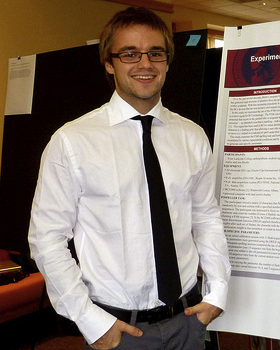
Research Interests
I am interested in many facets of cognitive processing, with my previous research largely being in brain-computer interface technology (BCI). My background in art has encouraged a profound curiosity about the visual system and how our brain activity and connectivity allows visual perception and mental imagery to occur. I am also particularly interested in the function of the hippocampus and entorhinal cortex in spatial representation, memory, and navigation, and the ways in which this spatial network reacts to visual inputs.
Quick Bio
I am originally from Eldersburg, MD and received a dual degree in Neuroscience (BS) and Studio Art (BA) at Lafayette College in Easton, PA (2008 - 2012). Originally a Biochemistry major, I gained an appreciation for neuroscience after taking an introductory course and eventually changed my degree to Neuroscience in order to do research in EEG-based brain-computer interfaces (BCIs) under the mentorship of Professors Lisa Gabel and Yih-Choung Yu. I continued this research by pursuing an honors thesis in my senior year, investigating the role that visual attention has on performance in an EEG-based BCI spelling system. With my spare credits I began taking art classes and I had the great privilege to work with abstract expressionist Ed Kerns and natural sculptor Jim Toia, assisting Ed with biologically-themed paintings and participating with Jim in the O-Positive Festival in Albany, NY. When I'm not doing science, I enjoy running, biking, painting, drawing and reading, all at once.
Publications
Lorenc, E.S., Pratte, M.S., Angeloni, C., Tong, F. (2013). Expertise for upright faces improves the precision but not the capacity of visual working memory. Attention, Perception, & Psychophysics. Advanced online publication
Angeloni, C. F., Salter, D., Corbit , V., Lorence, T., Yu, Y-C. & Gabel, L. A. (2012). P300-based brain-computer interface memory game to improve motivation and performance. Proc. of Ann. NEBEC, 38:35-36.

